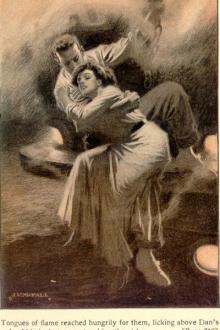Jackanapes by Juliana Horatio Ewing (life changing books to read txt) 📕

- Author: Juliana Horatio Ewing
Book online «Jackanapes by Juliana Horatio Ewing (life changing books to read txt) 📕». Author Juliana Horatio Ewing
CONTENTS
CHAPTER I. "Last noon beheld them full of life, Last eve in beauty's circle proudly gay."
CHAPTER II. "And he wandered away and away With Nature, the dear old nurse."
CHAPTER III. "If studious, copie fair what time hath blurred, Redeem truth from his jawes."
CHAPTER IV. "Greater love hath no man than this, that a man lay down his life for his friends."
CHAPTER V. "Then, said he, 'I am going to my Father's.'"
CHAPTER VI. "Und so ist der blaue Himmel grösser als jedes Gewölk darin, und dauerhafter dazu."
" If I might buffet for my love, or bound my horse for her
favors, I could lay on like a butcher, and sit like a
Jackanapes, never off !"
KING HENRY V, Act 5, Scene 2.
* * * * *
CHAPTER I.
Last noon beheld them full of lusty life,
Last eve in Beauty's circle proudly gay,
The midnight brought the signal sound of strife,
The morn the marshalling in arms - the day
Battle's magnificently stern array!
The thunder clouds close o'er it, which when rent
The earth is covered thick with other clay,
Which her own clay shall cover, heaped and pent,
Rider and horse: - friend, foe, - in one red burial blent.
Their praise is hymn'd by loftier harps than mine:
Yet one would I select from that proud throng.
- - to thee, to thousands, of whom each
And one as all a ghastly gap did make
In his own kind and kindred, whom to teach
Forgetfulness were mercy for their sake;
The Archangel's trump, not glory's, must awake
Those whom they thirst for. - BYRON.
Two Donkeys and the Geese lived on the Green, and all other residents of any social standing lived in houses round it. The houses had no names. Everybody's address was, "The Green," but the Postman and the people of the place knew where each family lived. As to the rest of the world, what has one to do with the rest of the world, when he is safe at home on his own Goose Green? Moreover, if a stranger did come on any lawful business, he might ask his way at the shop.
Most of the inhabitants were long-lived, early deaths (like that of the little Miss Jessamine) being exceptional; and most of the old people were proud of their age, especially the sexton, who would be ninety-nine come Martinmas, and whose father remembered a man who had carried arrows, as a boy, for the battle of Flodden Field. The Grey Goose and the big Miss Jessamine were the only elderly persons who kept their ages secret. Indeed, Miss Jessamine never mentioned any one's age, or recalled the exact year in which anything had happened. She said that she had been taught that it was bad manners to do so "in a mixed assembly."
The Grey Goose also avoided dates, but this was partly because her brain, though intelligent, was not mathematical, and computation was beyond her. She never got farther than "last Michaelmas," "the Michaelmas before that," and "the Michaelmas before the Michaelmas before that." After this her head, which was small, became confused, and she said, "Ga, ga!" and changed the subject.
But she remembered the little Miss Jessamine, the Miss Jessamine with the "conspicuous" hair. Her aunt, the big Miss Jessamine, said it was her only fault. The hair was clean, was abundant, was glossy, but do what you would with it, it never looked like other people's. And at church, after Saturday night's wash, it shone like the best brass fender after a Spring cleaning. In short, it was conspicuous, which does not become a young woman - especially in church.
Those were worrying times altogether, and the Green was used for strange purposes. A political meeting was held on it with the village Cobbler in the chair, and a speaker who came by stage coach from the town, where they had wrecked the bakers' shops, and discussed the price of bread. He came a second time, by stage, but the people had heard something about him in the meanwhile, and they did not keep him on the Green. They took him to the pond and tried to make him swim, which he could not do, and the whole affair was very disturbing to all quiet and peaceable fowls. After which another man came, and preached sermons on the Green, and a great many people went to hear him; for those were "trying times," and folk ran hither and thither for comfort. And then what did they do but drill the ploughboys on the Green, to get them ready to fight the French, and teach them the goose-step! However, that came to an end at last, for Bony was sent to St. Helena, and the ploughboys were sent back to the plough.
Everybody lived in fear of Bony in those days, especially the naughty children, who were kept in order during the day by threats of, "Bony shall have you," and who had nightmares about him in the dark. They thought he was an Ogre in a cocked hat. The Grey Goose thought he was a fox, and that all the men of England were going out in red coats to hunt him. It was no use to argue the point, for she had a very small head, and when one idea got into it there was no room for another.
Besides, the Grey Goose never saw Bony, nor did the children, which rather spoilt the terror of him, so that the Black Captain became more effective as a Bogy with hardened offenders. The Grey Goose remembered
his coming to the place perfectly. What he came for she did not pretend to know. It was all part and parcel of the war and bad times. He was called the Black Captain, partly because of himself, and partly because of his wonderful black mare. Strange stories were afloat of how far and how fast that mare could go, when her master's hand was on her mane and he whispered in her ear. Indeed, some people thought we might reckon ourselves very lucky if we were not out of the frying-pan into the fire, and had not got a certain well-known Gentleman of the Road to protect us against the French. But that, of course, made him none the less useful to the Johnson's Nurse, when the little Miss Johnsons were naughty.
"You leave off crying this minnit, Miss Jane, or I'll give you right away to that horrid wicked officer. Jemima! just look out o' the windy, if you please, and see if the Black Cap'n's a-com-ing with his horse to carry away Miss Jane."
And there, sure enough, the Black Captain strode by, with his sword clattering as if it did not know whose head to cut off first. But he did not call for Miss Jane that time. He went on to the Green, where he came so suddenly upon the eldest Master Johnson, sitting in a puddle on purpose, in his new nankeen skeleton suit, that the young gentleman thought judgment had overtaken him at last, and abandoned himself to the howlings of despair. His howls were redoubled when he was clutched from behind and swung over the Black Captain's shoulder, but in five minutes his tears were stanched, and he was playing with the officer's accoutrements. All of which the Grey Goose saw with her own eyes, and heard afterwards that that bad boy had been whining to go back to the Black Captain ever since, which showed how hardened he was, and that nobody but Bonaparte himself could be expected to do him any good.
But those were "trying times." It was bad enough when the pickle of a large and respectable family cried for the Black Captain; when it came to the little Miss Jessamine crying for him, one felt that the sooner the French landed and had done with it the better.
The big Miss Jessamine's objection to him was that he was a soldier, and this prejudice was shared by all the Green. "A soldier," as the speaker from the town had observed, "is a bloodthirsty, unsettled sort of a rascal; that the peaceable, home-loving, bread-winning citizen can never conscientiously look on as a brother, till he has beaten his sword into a ploughshare, and his spear into a pruning-hook."
On the other hand there was some truth in what the Postman (an old soldier) said in reply; that the sword has to cut a way for us out of many a scrape into which our bread-winners get us when they drive their ploughshares into fallows that don't belong to them. Indeed, whilst our most peaceful citizens were prosperous chiefly by means of cotton, of sugar, and of the rise and fall of the money-market (not to speak of such salable matters as opium, firearms, and "black ivory"), disturbances were apt to arise in India, Africa and other outlandish parts, where the fathers of our domestic race were making fortunes for their families. And, for that matter, even on the Green, we did not wish the military to leave us in the lurch, so long as there was any fear that the French were coming.[1]
[Footnote 1: "The political men declare war, and generally for commercial interests; but when the nation is thus embroiled with its neighbors the soldier ... draws the sword, at the command of his country.... One word as to thy comparison of military and commercial persons. What manner of men be they who have supplied the Caffres with the firearms and ammunition to maintain their savage and deplorable wars? Assuredly they are not military.... Cease then, if thou would'st be counted among the just, to vilify soldiers." - W. NAPIER, Lieut. General, November , 1851.]
To let the Black Captain have little Miss Jessamine, however, was another matter. Her Aunt would not hear of it; and then, to crown all, it appeared that the Captain's father did not think the young lady good enough for his son. Never was any affair more clearly brought to a conclusion.
But those were "trying times;" and one moon-light night, when the Grey Goose was sound asleep upon one leg, the Green was rudely shaken under her by the thud of a horse's feet. "Ga, ga!" said she, putting down the other leg, and running away.
By the time she returned to her place not a thing was to be seen or heard. The horse had passed like a shot. But next day, there was hurrying and skurrying and cackling at a very early hour, all about the white house with the black beams, where Miss Jessamine lived. And when the sun was so low, and the shadows so long on the grass that the





Comments (0)